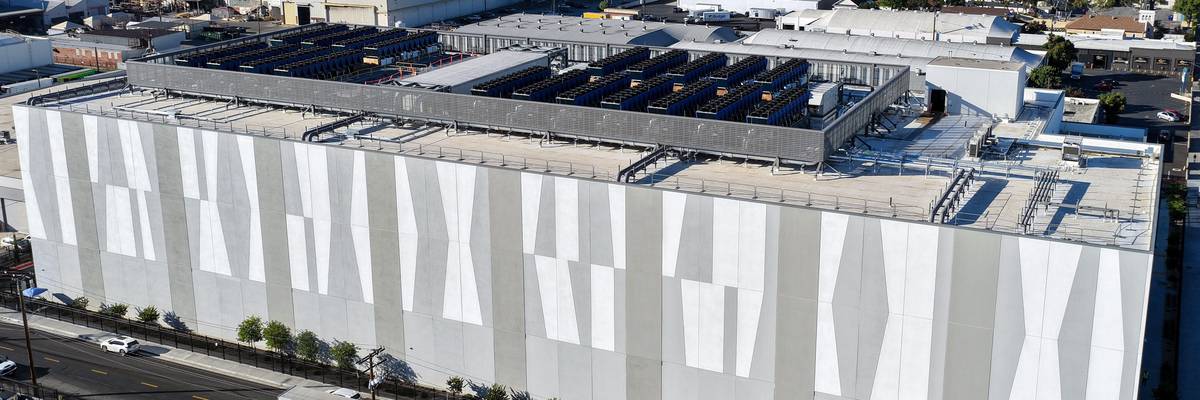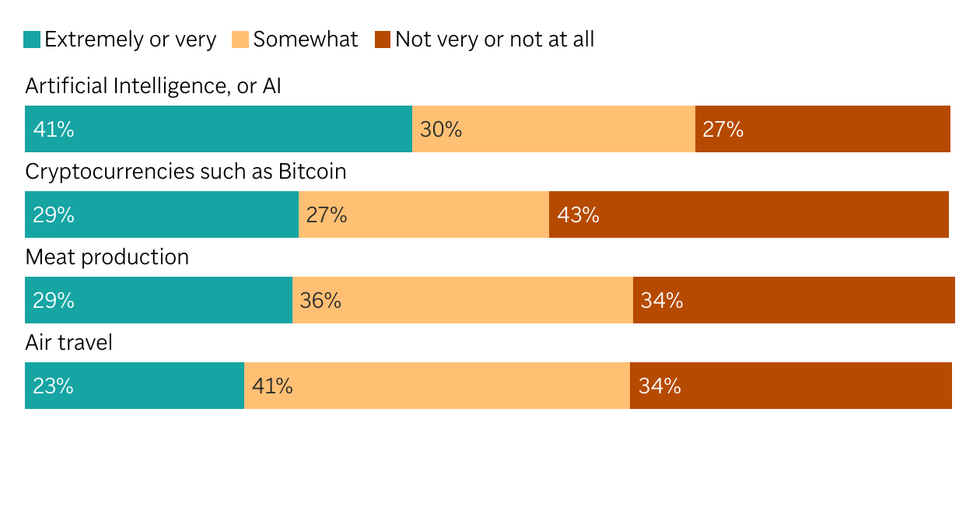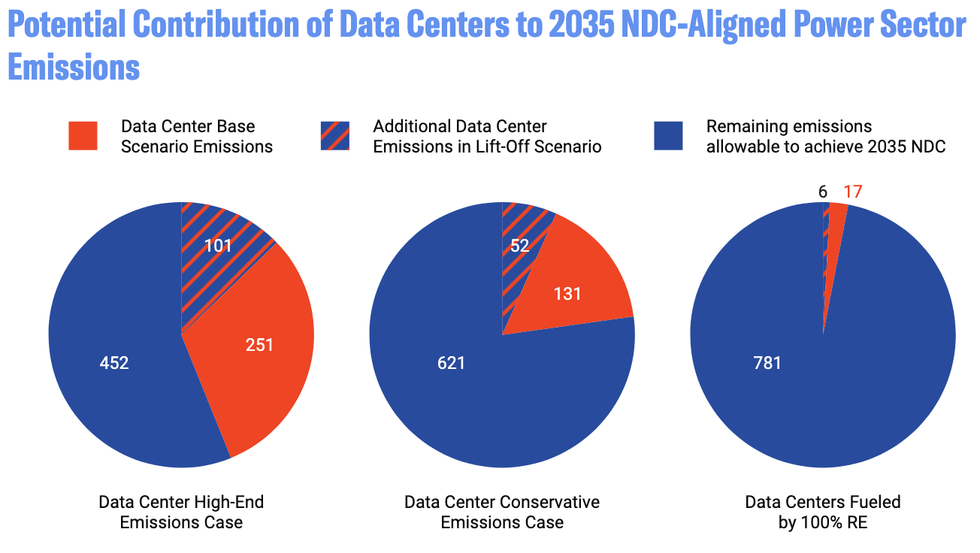

SUBSCRIBE TO OUR FREE NEWSLETTER
Daily news & progressive opinion—funded by the people, not the corporations—delivered straight to your inbox.
5
#000000
#FFFFFF
To donate by check, phone, or other method, see our More Ways to Give page.


Daily news & progressive opinion—funded by the people, not the corporations—delivered straight to your inbox.

A surge in demand for artificial intelligence infrastructure is fueling a boom in data centers, such as this one with a closed-loop cooling system in Vernon, California, photographed from the air on October 20, 2025.
A report co-author at the Center for Biological Diversity warned that President Donald Trump "is determined to feed the voracious AI vortex with more dirty fossil fuels that harm the whole world."
Experts around the world have expressed a wide range of concerns about rapidly advancing artificial intelligence, particularly its impact on the planet, and a report released Wednesday details how fossil fuel-powered data centers for the AI industry in the United States are "threatening to sabotage the country's already faltering climate goals."
President Donald Trump "is determined to feed the voracious AI vortex with more dirty fossil fuels that harm the whole world," said Jean Su, energy justice director at the Center for Biological Diversity (CBD) and co-author of the report, Data Crunch: How the AI Boom Threatens to Entrench Fossil Fuels and Compromise Climate Goals.
"This report shows how the US is about to set off an explosion of dirty data center emissions, entrenching more fossil fuels when we need their rapid phaseout," she continued. "We need meaningful guardrails at every level to ward off this huge threat to our air, water, and climate—and guard against energy price spikes for consumers."
Specifically, the report shows that "the projected AI surge, set to be powered primarily by fracked gas, could account for 10% of the economy-wide emissions and 44% of the power sector emissions allowable to meet the US 2035 climate target, or nationally determined contribution (NDC)."
"Feeding data centers with fossil fuels is taking the climate crisis we have now and blowing it up like the Incredible Hulk."
"Because of expected fossil fuel-reliant AI data center growth," the report warns, "all other electricity-consuming sectors would need to increase their carbon emissions cuts by 60% to keep pace with the US 2035 NDC."
NDCs are countries' commitments to cut greenhouse gas emissions as part of the Paris Agreement, which the US president ditched, again, after returning to office early this year, having campaigned on promises to "drill, baby, drill." In preparation for COP30—the United Nations climate summit in Brazil next month that the Trump administration does not plan to attend—the UN announced Tuesday that governments' latest NDCs are, overall, dramatically inadequate to meet the Paris goals.
In addition to attacking the limited climate progress that the United States made under his predecessor, Trump is pushing for unfettered AI development—which will require several new unpopular, power-sucking data centers. Polling published last week by the Associated Press-NORC Center for Public Affairs Research and the Energy Policy Institute at the University of Chicago found that 71% of US adults are somewhat, very, or extremely concerned about the environmental impacts of AI.

Already, "the US disproportionately holds the planet's highest concentration of data centers and is the greatest contributor of AI climate pollution," the CBD report points out. "Without significant changes, US data center expansion is completely incompatible with the 2035 US climate goal, jeopardizing the world's chances of avoiding the worst consequences of climate change and staying within the Paris Agreement target of 1.5°C of global warming."
As John Fleming, a report co-author and scientist at CBD's Climate Law Institute, put it, "Feeding data centers with fossil fuels is taking the climate crisis we have now and blowing it up like the Incredible Hulk."
"A gas-fed AI boom is going to hurdle us past any chance of keeping to our climate goal or maintaining a safe and healthy future for our planet," he added. "To the extent that data center buildout is needed at all, it should be powered only by clean, renewable energy."

The report highlights that "if the projected AI surge were instead powered fully by renewables, it would account for only 4% of the power sector emissions and a negligible amount of the economy-wide emissions allowable to meet the United States' 2035 climate target."
"Guardrails are needed at global and national levels to curb data centers' immense climate emissions," the report stresses, "including adoption of a public interest framework on permitting decisions and requiring onsite and distributed renewable energy and storage for power generation."
Dear Common Dreams reader, The U.S. is on a fast track to authoritarianism like nothing I've ever seen. Meanwhile, corporate news outlets are utterly capitulating to Trump, twisting their coverage to avoid drawing his ire while lining up to stuff cash in his pockets. That's why I believe that Common Dreams is doing the best and most consequential reporting that we've ever done. Our small but mighty team is a progressive reporting powerhouse, covering the news every day that the corporate media never will. Our mission has always been simple: To inform. To inspire. And to ignite change for the common good. Now here's the key piece that I want all our readers to understand: None of this would be possible without your financial support. That's not just some fundraising cliche. It's the absolute and literal truth. We don't accept corporate advertising and never will. We don't have a paywall because we don't think people should be blocked from critical news based on their ability to pay. Everything we do is funded by the donations of readers like you. Will you donate now to help power the nonprofit, independent reporting of Common Dreams? Thank you for being a vital member of our community. Together, we can keep independent journalism alive when it’s needed most. - Craig Brown, Co-founder |
Experts around the world have expressed a wide range of concerns about rapidly advancing artificial intelligence, particularly its impact on the planet, and a report released Wednesday details how fossil fuel-powered data centers for the AI industry in the United States are "threatening to sabotage the country's already faltering climate goals."
President Donald Trump "is determined to feed the voracious AI vortex with more dirty fossil fuels that harm the whole world," said Jean Su, energy justice director at the Center for Biological Diversity (CBD) and co-author of the report, Data Crunch: How the AI Boom Threatens to Entrench Fossil Fuels and Compromise Climate Goals.
"This report shows how the US is about to set off an explosion of dirty data center emissions, entrenching more fossil fuels when we need their rapid phaseout," she continued. "We need meaningful guardrails at every level to ward off this huge threat to our air, water, and climate—and guard against energy price spikes for consumers."
Specifically, the report shows that "the projected AI surge, set to be powered primarily by fracked gas, could account for 10% of the economy-wide emissions and 44% of the power sector emissions allowable to meet the US 2035 climate target, or nationally determined contribution (NDC)."
"Feeding data centers with fossil fuels is taking the climate crisis we have now and blowing it up like the Incredible Hulk."
"Because of expected fossil fuel-reliant AI data center growth," the report warns, "all other electricity-consuming sectors would need to increase their carbon emissions cuts by 60% to keep pace with the US 2035 NDC."
NDCs are countries' commitments to cut greenhouse gas emissions as part of the Paris Agreement, which the US president ditched, again, after returning to office early this year, having campaigned on promises to "drill, baby, drill." In preparation for COP30—the United Nations climate summit in Brazil next month that the Trump administration does not plan to attend—the UN announced Tuesday that governments' latest NDCs are, overall, dramatically inadequate to meet the Paris goals.
In addition to attacking the limited climate progress that the United States made under his predecessor, Trump is pushing for unfettered AI development—which will require several new unpopular, power-sucking data centers. Polling published last week by the Associated Press-NORC Center for Public Affairs Research and the Energy Policy Institute at the University of Chicago found that 71% of US adults are somewhat, very, or extremely concerned about the environmental impacts of AI.

Already, "the US disproportionately holds the planet's highest concentration of data centers and is the greatest contributor of AI climate pollution," the CBD report points out. "Without significant changes, US data center expansion is completely incompatible with the 2035 US climate goal, jeopardizing the world's chances of avoiding the worst consequences of climate change and staying within the Paris Agreement target of 1.5°C of global warming."
As John Fleming, a report co-author and scientist at CBD's Climate Law Institute, put it, "Feeding data centers with fossil fuels is taking the climate crisis we have now and blowing it up like the Incredible Hulk."
"A gas-fed AI boom is going to hurdle us past any chance of keeping to our climate goal or maintaining a safe and healthy future for our planet," he added. "To the extent that data center buildout is needed at all, it should be powered only by clean, renewable energy."

The report highlights that "if the projected AI surge were instead powered fully by renewables, it would account for only 4% of the power sector emissions and a negligible amount of the economy-wide emissions allowable to meet the United States' 2035 climate target."
"Guardrails are needed at global and national levels to curb data centers' immense climate emissions," the report stresses, "including adoption of a public interest framework on permitting decisions and requiring onsite and distributed renewable energy and storage for power generation."
Experts around the world have expressed a wide range of concerns about rapidly advancing artificial intelligence, particularly its impact on the planet, and a report released Wednesday details how fossil fuel-powered data centers for the AI industry in the United States are "threatening to sabotage the country's already faltering climate goals."
President Donald Trump "is determined to feed the voracious AI vortex with more dirty fossil fuels that harm the whole world," said Jean Su, energy justice director at the Center for Biological Diversity (CBD) and co-author of the report, Data Crunch: How the AI Boom Threatens to Entrench Fossil Fuels and Compromise Climate Goals.
"This report shows how the US is about to set off an explosion of dirty data center emissions, entrenching more fossil fuels when we need their rapid phaseout," she continued. "We need meaningful guardrails at every level to ward off this huge threat to our air, water, and climate—and guard against energy price spikes for consumers."
Specifically, the report shows that "the projected AI surge, set to be powered primarily by fracked gas, could account for 10% of the economy-wide emissions and 44% of the power sector emissions allowable to meet the US 2035 climate target, or nationally determined contribution (NDC)."
"Feeding data centers with fossil fuels is taking the climate crisis we have now and blowing it up like the Incredible Hulk."
"Because of expected fossil fuel-reliant AI data center growth," the report warns, "all other electricity-consuming sectors would need to increase their carbon emissions cuts by 60% to keep pace with the US 2035 NDC."
NDCs are countries' commitments to cut greenhouse gas emissions as part of the Paris Agreement, which the US president ditched, again, after returning to office early this year, having campaigned on promises to "drill, baby, drill." In preparation for COP30—the United Nations climate summit in Brazil next month that the Trump administration does not plan to attend—the UN announced Tuesday that governments' latest NDCs are, overall, dramatically inadequate to meet the Paris goals.
In addition to attacking the limited climate progress that the United States made under his predecessor, Trump is pushing for unfettered AI development—which will require several new unpopular, power-sucking data centers. Polling published last week by the Associated Press-NORC Center for Public Affairs Research and the Energy Policy Institute at the University of Chicago found that 71% of US adults are somewhat, very, or extremely concerned about the environmental impacts of AI.

Already, "the US disproportionately holds the planet's highest concentration of data centers and is the greatest contributor of AI climate pollution," the CBD report points out. "Without significant changes, US data center expansion is completely incompatible with the 2035 US climate goal, jeopardizing the world's chances of avoiding the worst consequences of climate change and staying within the Paris Agreement target of 1.5°C of global warming."
As John Fleming, a report co-author and scientist at CBD's Climate Law Institute, put it, "Feeding data centers with fossil fuels is taking the climate crisis we have now and blowing it up like the Incredible Hulk."
"A gas-fed AI boom is going to hurdle us past any chance of keeping to our climate goal or maintaining a safe and healthy future for our planet," he added. "To the extent that data center buildout is needed at all, it should be powered only by clean, renewable energy."

The report highlights that "if the projected AI surge were instead powered fully by renewables, it would account for only 4% of the power sector emissions and a negligible amount of the economy-wide emissions allowable to meet the United States' 2035 climate target."
"Guardrails are needed at global and national levels to curb data centers' immense climate emissions," the report stresses, "including adoption of a public interest framework on permitting decisions and requiring onsite and distributed renewable energy and storage for power generation."